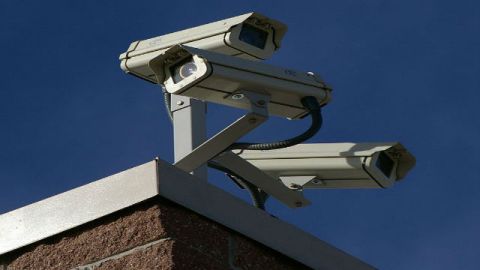Big Brother IS Watching, and I Feel Fine.

The idea of Big Brother government snooping on us, listening in on our phone calls, intercepting our e mails, watching us with all kinds of surveillance devices, offends most people…until we’re afraid, and we need government to protect us from what we can’t protect ourselves from as individuals. Then, well, all that surveillance doesn’t bother us as much, because between our desire for civil liberties and independent control over our own lives, and our deep desire for safety…staying safe wins, hands down.
A CBS/New York Times public opinion survey taken after the Boston Marathon bombings is the latest evidence of this fundamental truth of human nature; the highest priority is usually staying alive, and everything else comes after that. 78% of Americans say surveillance cameras in public places are a good idea. That’s not surprising, given the wide publicity the government gave the surveillance pictures of the two bombers, images collected by investigators from private and business cameras. Lost in all that publicity, of course, is the fact that the pictures and videos had nothing to do with catching the bombers. In fact, even when friends of the bombers saw those images it didn’t prompt them to call law enforcement.
That fact would appeal to the American Civil Liberties Union (ACLU), which opposes more Big Brother surveillance and argues that cameras that watch us everywhere (in public, where there is no legal right to or expectation privacy) don’t deter crime. But that doesn’t matter. If it feels like government surveillance makes us safer, we’ll support it. Only when we are less worried do we see surveillance as an invasion of privacy, rather than protection.
Consider the experience in the U.K., where there are now 1.85 million cameras in the CCTV (closed circuit television) system, a stunning 2.8 public and private surveillance cameras watching public places for every 100 people! Some of them even have speakers, so that officials monitoring the cameras can yell “Hey YOU! STOP THAT!” if they see someone fighting, or even littering! How’s that for Big Brother! (That system was so successful in the first community where it was tried that it was expanded around the country.)
The omnipresence of such surveillance is accepted by the majority of Britons, because the system arose out of the omnipresent threat of terrorist bombings in the 70s and 80s, and fear trumps the desire for privacy. Never mind that terrorism is no longer as frequent as it was then. It happens often enough to keep people worried, and that’s enough to keep support for surveillance high.
Despite the ACLU’s claim, there is ample evidence that surveillance also helps deter crime, or at least catch the bad guys after the fact, and that helps us feel safe too, at least in public, where we not only have less expectation of privacy but feel more vulnerable. But we are much more opposed to the various ways Big Brother government can snoop on us in private, because in most private settings, we feel safer, less exposed, better able to protect ourselves. When we feel safer, the seesaw of our emotions tilts the other way, and independent control over our own lives carries more weight than fear does.
There are all sorts of arguments being offered about whether there should be more surveillance in the U.S., and whether it works to deter terrorism, or crime, and what the legal restraints ought to be to make sure any surveillance doesn’t go too far. People are arguing their case with lots of facts and great passion. But there is no right or wrong here, just our values and feelings, and this clarion example of the inherently affective, subjective nature of the psychology of risk perception.
As proof of that, note that this debate is taking place now, when we have just been reminded of our vulnerability. What will determine what we do about surveillance, as is the case with any risk, will ultimately have less to do with the facts than how worried we feel.





